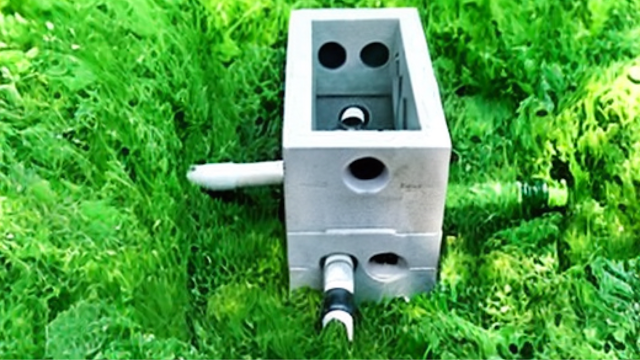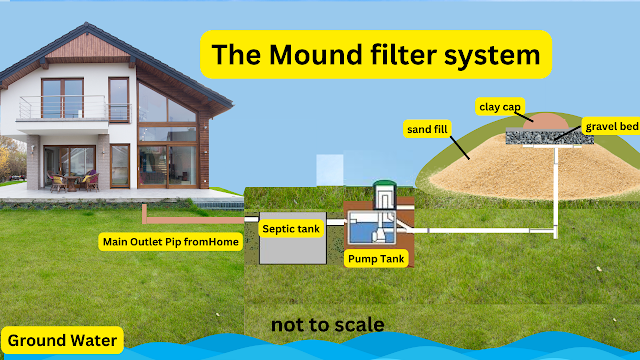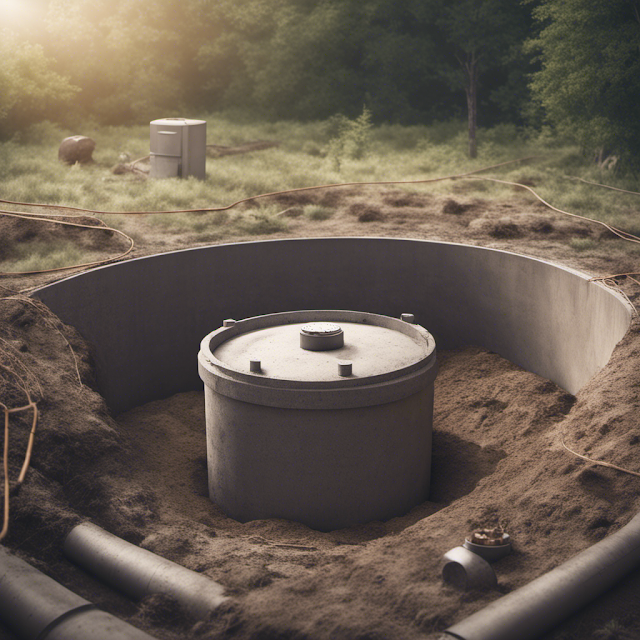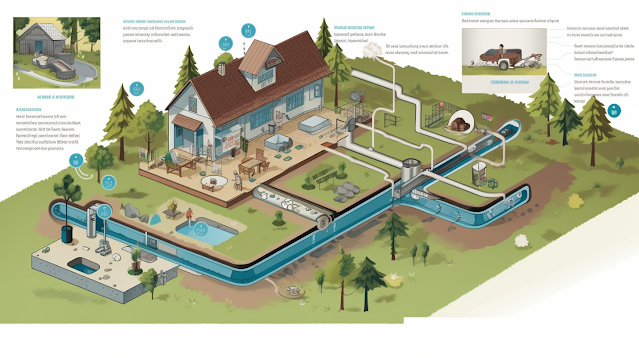Penalties for Illegal Septic Systems: $7 million Shocking Consequences Revealed
 |
| Penalties for Illegal Septic Systems |
Penalties for Illegal Septic Systems: Shocking Consequences Revealed
Introduction
Penalties for Illegal Septic Systems can be very costly in fact they can run into $ thousands. So let's find out how not to get caught out knowingly or unknowingly.
Septic systems are underground wastewater treatment structures that are commonly used in rural areas where there are no centralized sewer systems. These systems treat and dispose of household wastewater on-site, without the need for a public sewage treatment plant. They consist of a septic tank and a drain field, also known as an absorption field or leach field.
The septic tank separates solids from the liquids, which then flow into the drain field where they are further treated by natural processes. Having a properly functioning septic system is important not only for the health of individuals and their families, but also for the environment.
When functioning correctly, these systems help to prevent contamination of groundwater and surface water sources, such as lakes and streams. However, illegal septic systems can have devastating consequences on both human health and environmental quality.
Septic Tanks Worst Mistakes to Make
Explanation of Septic System Importance
Septic systems play an essential role in managing household wastewater in areas that lack centralized sewer systems. As mentioned earlier, these systems work by separating solids from liquids in a tank before releasing the treated liquid into the surrounding soil through a drain field.
Properly designed, installed and maintained septic tanks can effectively remove up to 90% of pollutants from domestic sewage. When households do not have access to centralized sewerage networks provided by local municipalities or private companies providing similar services – at times due to distance or high cost – individual households rely heavily on their own personal septic systems to manage their domestic sewage waste effectively.
These small packages of individualized wastewater management arrangements assist in reducing contamination levels within bodies of water by preventing untreated wastewater discharge directly into waterways. Without properly functioning septic systems, faecal matter could be discharged directly onto land or into nearby rivers and lakes causing extensive pollution with associated risks to human health.
Brief Overview on Illegal Septic System Impact
Unfortunately, not all homeowners choose to install or maintain septic systems according to local regulations. Illegal septic systems are typically those that have been installed without a proper permit, do not comply with local ordinances or that have been poorly maintained leading to contamination of surrounding soil and water bodies. The impact of illegal septic systems on the environment is significant.
When these systems fail, untreated sewage can leak into the surrounding soil and groundwater, leading to a plethora of health problems for humans, animals, and plants living in the area. Heavy contamination also means that it will severely affect the quality of nearby water bodies such as lakes, rivers, and streams.
Further risks include polluted run-off entering other areas through stormwater drainage infrastructure. Additionally, when household owners do not install their septic systems correctly, resultant pollution could impact neighboring property values due to contaminated wells or groundwater sources from a failed system impacting human health in surrounding communities.
Types of Illegal Septic Systems
Septic systems are designed to ensure that wastewater is safely disposed of in a manner that does not harm the environment or public health. Unfortunately, some property owners either ignore the rules or are unaware of them, leading to several types of illegal septic systems.
Unpermitted Installations
Unpermitted installations are those that were built without obtaining a permit from the local government agency responsible for regulating septic systems. Building a septic system without a permit is not only illegal but can also lead to serious consequences in the future.
Without proper oversight and inspections, an unpermitted installation may be poorly designed, improperly installed, or fail to meet code requirements. In some cases, property owners may have inherited an unpermitted system from previous owners and may not be aware of its status until they attempt to sell their property or have it inspected for maintenance purposes.
Non-Compliant Installations
A non-compliant installation is one that was permitted but failed to meet local codes and regulations regarding septic system design and installation. There are numerous reasons why a permitted installation may be non-compliant, including improper sizing for the number of bedrooms in the house or inadequate soil absorption capacity.
Non-compliant installations can pose environmental risks such as groundwater contamination or surface water pollution. Additionally, non-compliance can result in fines levied by local regulatory agencies and forced repairs to bring the system up to code standards.
Improper Maintenance
Even when a septic system is properly installed with all necessary permits and regulatory compliance measures taken into account, it still requires regular maintenance and upkeep. Improper maintenance can lead to various problems over time such as clogged discharge pipes leading waste back into your home’s drainage system, slow-draining sinks and toilets caused by backed-up tanks among others.
Septic systems that are not regularly serviced can develop major problems that can be costly to repair, putting the property owner at risk of environmental damage or human exposure to dangerous waste materials. Proper maintenance practices should be followed, such as regular pumping and inspection of the septic tank and drainfield.
The Importance of Proper System Installation and Maintenance
While unpermitted installations, non-compliant installations, and improper maintenance pose different environmental risks and legal liabilities, they all share the need for proper installation and maintenance. The cost of repairing or replacing an illegal septic system can be enormous, not to mention the potential harm to public health or the environment. Collaboration with local regulatory agencies responsible for oversight of septic systems is highly encouraged.
Property owners must ensure that all necessary permits are obtained before installing a new septic system on their land. Additionally, proper installation is essential in ensuring compliance with local codes and standards which helps avoid any future penalties or legal actions.
The need for regular maintenance is crucial in keeping your system working properly and reducing long-term costs associated with repairs or replacement. Property owners must prioritize regular pumping services performed by certified professionals if they want their system to function correctly while avoiding penalties associated with non-compliance.
Consequences of Illegal Septic Systems
Septic systems are designed to safely treat and dispose of wastewater from residential and commercial properties. However, illegal septic systems have a wide range of negative consequences that can pose significant risks to humans, animals, and the environment.
Health Hazards to Humans and Animals
Illegal septic systems can pose serious health hazards to humans and animals alike. When septic systems fail or are improperly maintained, untreated sewage can contaminate the soil and water sources, potentially exposing people and animals to harmful bacteria and viruses.
Exposure to these pathogens can result in a wide range of illnesses, including gastrointestinal infections, skin rashes, respiratory infections, and even neurological disorders. Children are particularly vulnerable to the health risks associated with illegal septic systems because they often play in close proximity to contaminated soil or water.
Environmental Damage to Soil, Water, and Air Quality
Environmental damage caused by illegal septic systems extends to soil, water, and air quality, leading to severe and long-lasting contamination. When untreated sewage is released into the soil or waterways surrounding a property, it introduces harmful pollutants that can persist for years. Sewage contains excessive amounts of nutrients such as nitrogen and phosphorus, which act as fertilizers, promoting the growth of harmful algae blooms in nearby rivers or lakes.
 |
| illegal Septic Systems Algae Bloom |
The proliferation of these algae blooms creates detrimental consequences, resulting in the formation of 'dead zones' where aquatic life cannot survive due to depleted oxygen levels. As the algae blooms die and decompose, oxygen is consumed, leading to hypoxic conditions. This lack of oxygen not only impacts fish and other aquatic organisms but also disrupts the entire ecosystem, including plants, insects, and other animals reliant on the affected water bodies. Moreover, the release of untreated sewage from illegal septic systems contributes to the emission of methane gases into the atmosphere. Methane is a potent greenhouse gas, with a significantly higher warming potential than carbon dioxide. Its release exacerbates global warming, contributing to the intensification of climate change and its associated impacts, such as rising temperatures, extreme weather events, and sea-level rise. The environmental impact of illegal septic systems on soil is also substantial. The introduction of untreated sewage can contaminate the soil, rendering it unsuitable for agricultural or recreational purposes. The pollutants present in the sewage can infiltrate and accumulate in the soil, posing risks to plants, animals, and humans who come into contact with it. This contamination not only affects the immediate vicinity of the illegal septic system but can also spread through groundwater, further polluting surrounding areas. To summarise this important section, the environmental consequences of illegal septic systems are far-reaching and devastating. The contamination caused by untreated sewage entering the soil and waterways can persist for extended periods, leading to the formation of harmful algae blooms, dead zones, and depleted oxygen levels. Additionally, the release of methane gases contributes significantly to global warming, exacerbating climate change. It is crucial to address and prevent the use of illegal septic systems to protect our soil, water, and air quality, as well as mitigate the broader environmental impacts associated with their operation.
Financial Burden on Property Owners and Taxpayers
Illegally installed or maintained septic system puts a huge financial burden on property owners who will be responsible for cleaning up any damage caused by them. The cost of repairing illegal installations is usually much higher than complying with regulations from the start.
Moreover taxpayers may have cover costs related legal action against property owners who refuse comply with local regulations or removal of illegal septic systems that pose a public health risk. Illegal septic systems lead to costly and often irreversible consequences.
In addition to the potential health hazards and environmental issues that can arise, property owners who fail to comply with local regulations face steep fines and legal action. Therefore it is important for property owners to ensure their septic systems are installed, maintained and operated in accordance with local regulations.
Penalties for illegal septic systems
Illegal septic systems are a serious violation of the law and can have severe consequences. Penalties for illegal septic systems can include fines, legal action, and required removal or repair of the system.
Fines imposed by local government agencies
One of the most common penalties for illegal septic systems is a fine imposed by local government agencies. The amount of the fine varies depending on the severity of the violation and can range from a few hundred dollars to thousands of dollars. See the full extent and shocking examples of heavy fines imposed further in this article.
In some cases, fines may be assessed on a daily basis until the problem is resolved. These fines are intended to encourage property owners to comply with regulations and discourage others from violating them.
It's important to note that fines may not always be enough to deter property owners from violating regulations. In some cases, more severe penalties may be necessary.
Legal action taken against property owners
In addition to fines, legal action may also be taken against property owners who violate septic system regulations. This can include civil lawsuits or criminal charges depending on the severity of the violation.
Property owners who violate regulations may be required to appear in court and pay restitution or damages if they caused harm to others or damaged public property. It's important for property owners to understand that legal action can have long-term consequences and should take measures to ensure their septic system is in compliance with regulations.
Required removal or repair of the illegal system
Another penalty for illegal septic systems is required removal or repair of the system. This penalty is typically reserved for more severe violations or cases where there is an immediate threat to public health or safety.
Property owners who are found in violation may be required to remove their existing system and install a new compliant system at their own expense. In some cases, repairs may be sufficient if they bring the existing system into compliance.
It's important for property owners to understand that this penalty can be costly and time-consuming. It's much easier and less expensive to comply with regulations from the outset than to risk violating them.
Local Regulations and Examples
California:
- Septic tanks must be installed by a licensed contractor.
- A permit is required to install or replace a septic tank.
- Septic tanks must be located at least 100 feet from any water source.
- Septic tanks must be pumped every three to five years, depending on the size of the tank and the number of people using it.
Florida:
- Septic tanks must be installed by a licensed contractor.
- A permit is required to install or replace a septic tank.
- Septic tanks must be located at least 50 feet from any water source.
- Septic tanks must be pumped every three to five years, depending on the size of the tank and the number of people using it.
Texas:
- Septic tanks must be installed by a licensed contractor.
- A permit is required to install or replace a septic tank in most areas.
- Septic tanks must be located at least 50 feet from any water source.
- Septic tanks must be pumped every three to five years, depending on the size of the tank and the number of people using it.
In addition to these regulations, there may be other requirements specific to the county or municipality where the septic tank is located. It is important to check with the local authorities to find out the specific requirements in your area.
Here are some examples of how different regions handle illegal septic systems in the US:
- In California, the Department of Public Health may issue a notice requiring the property owner to remove or upgrade the illegal septic system. If the property owner fails to comply with the notice, the Department of Public Health may take enforcement action, which could include fines of up to $10,000 per day.
- In Florida, the Department of Environmental Protection may issue a notice requiring the property owner to remove or upgrade the illegal septic system. If the property owner fails to comply with the notice, the Department of Environmental Protection may take enforcement action, which could include fines of up to $5,000 per day.
- In Texas, the Texas Commission on Environmental Quality may issue a notice requiring the property owner to remove or upgrade the illegal septic system. If the property owner fails to comply with the notice, the Texas Commission on Environmental Quality may take enforcement action, which could include fines of up to $2,000 per day.
It is important to note that these are just a few examples, and the specific penalties for illegal septic systems may vary from state to state. It is always best to check with the local authorities to find out the specific penalties in your area.
- Check with your local authorities to find out the specific regulations for septic tanks in your area. This will help you understand what you need to do to keep your system in compliance.
- Have your septic tank pumped regularly. This will help prevent solids from building up and clogging the system.
- Do not overload your septic system. This means only flushing human waste and toilet paper down the toilet, and avoiding pouring grease, oil, or chemicals down the drain.
- Maintain your septic system properly. This includes inspecting the tank and drain field regularly for signs of damage or leaks.
If you suspect that your septic system might be illegal, there are a few things you can do:
 |
| illegal septic system get in touch with local authority |
- Contact your local authorities. They will be able to tell you if your system is legal and, if not, what you need to do to bring it into compliance.
- Have your septic system inspected by a licensed contractor. They will be able to tell you if the system is in good working order and if it meets the local regulations.
- Make necessary repairs or upgrades to bring the system into compliance. This may involve pumping the tank, repairing leaks, or replacing the drain field.
To avoid penalties for an illegal septic system, it is important to comply with the local regulations as soon as possible. This may involve making repairs or upgrades to the system, or even removing and replacing the system altogether. The specific penalties for an illegal septic system will vary depending on the local regulations, but they could include fines, penalties, or even legal action.
It's not just individuals that get fines for Septic Systems this recent prosecution has cost $7 million
Here are some additional tips to help you avoid penalties for an illegal septic system:
- Get a permit before you install or replace a septic tank. This will help ensure that the system meets the local regulations.
- Have your septic system installed by a licensed contractor. This will help ensure that the system is installed correctly and will last for many years.
- Maintain your septic system regularly. This will help prevent problems and keep the system in compliance.
By following these tips, you can help ensure that your septic system is compliant and that you avoid penalties.
Alternatives to Illegal Systems
When it comes to dealing with illegal septic tanks, it is important to consider alternatives that can address the problem effectively and sustainably. Here are some alternatives to illegal systems: 1. Education and Awareness: One effective approach is to raise awareness about the importance of proper septic tank management. By educating the community about the risks associated with illegal systems and the benefits of compliance, individuals are more likely to voluntarily adhere to regulations. 2. Incentives and Subsidies: Governments can offer financial incentives or subsidies to encourage property owners to upgrade their septic systems to legal and environmentally-friendly alternatives. This could include grants, tax breaks, or reduced permit fees for those who comply with regulations. 3. Community-based Solutions: Encouraging community engagement and collaboration can lead to the development of collective solutions. This could involve the establishment of local committees or associations responsible for overseeing septic tank management within a specific area. 4. Technology Upgrades: Advancements in septic tank technology have resulted in more efficient and environmentally-friendly systems. Promoting the use of these advanced systems, such as aerobic treatment units or passive filtration systems, can help reduce the reliance on illegal septic tanks. 5. Regular Inspections and Maintenance: Implementing a comprehensive inspection and maintenance program can help identify illegal septic tanks and ensure that legal systems are functioning properly. This could involve regular inspections by local authorities or certified professionals to guarantee compliance. 6. Collaboration with Stakeholders: Collaborating with various stakeholders, such as local environmental organizations, health departments, and community leaders, can lead to the development of comprehensive strategies to address illegal septic tanks. By pooling resources and expertise, these stakeholders can work together to enforce regulations and provide support to property owners in need of assistance. By providing alternatives to illegal septic systems, authorities can encourage compliance and promote environmentally conscious practices. These alternatives not only help prevent pollution and protect public health but also contribute to the overall sustainability of communities.
Comparative Costs
1. Penalties:
Homeowners who install or maintain illegal septic systems may face penalties imposed by regulatory authorities. These penalties can vary depending on local regulations but typically include fines, citations, or legal actions. The costs associated with penalties can quickly add up and become a significant financial burden.
2. Remediation Expenses:
If a homeowner is found to have an illegal septic system, they may be required to remediate the situation promptly. Remediation involves correcting the system to bring it into compliance with local regulations. The expenses associated with remediation can include hiring professional contractors, obtaining necessary permits, and purchasing new equipment or materials. These costs can be substantial, especially if extensive repairs or system replacement is required.
3. Environmental Damage:
Illegal septic systems often pose a significant risk to the environment and public health. In addition to financial penalties, homeowners may be liable for environmental damage caused by their illegal systems. This can result in further expenses, such as fines for environmental violations, costs associated with contaminated water sources, or remediation of affected areas.
4. Proper Septic System Installation and Maintenance:
Investing in a legal and well-maintained septic system from the start is a proactive approach that can save homeowners from potential financial risks. While proper installation and regular maintenance incur associated costs, they are significantly lower compared to penalties, remediation, and potential environmental damages resulting from illegal systems.
Section Summary:
Choosing to install or maintain an illegal septic system may initially seem like a way to save money. However, the potential financial risks, including penalties, remediation expenses, and environmental damage costs, can far outweigh the short-term savings. Homeowners are strongly encouraged to invest in legal and well-maintained septic systems to mitigate these risks and ensure a safe, efficient, and cost-effective wastewater management solution.
The Importance of Community Engagement in Addressing Illegal Septic Tanks
In the previous sections, we discussed the penalties associated with illegal septic tanks and the adverse effects they can have on public health and the environment. However, rather than solely focusing on punitive measures, it is crucial to emphasize the significance of community engagement in tackling this issue. In this section, we will explore the benefits of fostering community involvement and how it can contribute to a more effective resolution of illegal septic tank problems.
1. Raising Awareness:
One of the primary objectives of community engagement is to increase awareness among residents about the consequences of illegal septic tanks. By educating the community about the environmental, health, and legal implications, individuals become more inclined to take proactive measures and report any suspected violations. This collective understanding helps in creating a sense of responsibility towards addressing the problem.
2. Encouraging Reporting:
Community engagement plays a vital role in encouraging residents to report instances of illegal septic tanks. Establishing clear channels for reporting, such as dedicated hotlines or online platforms, can empower community members to voice their concerns without fear of retribution. By involving the community as active participants, authorities gain a broader network of eyes and ears, improving the chances of identifying and resolving illegal septic tank cases promptly.
3. Collaboration with Local Organizations:
Engaging local organizations, such as community associations or environmental groups, can significantly enhance efforts to combat illegal septic tanks. These organizations often have established networks and resources that can be leveraged to raise awareness, conduct community-driven initiatives, or even organize cleanup campaigns. Collaborating with such entities strengthens the collective voice against illegal septic tanks and fosters a sense of unity within the community.
4. Public-Private Partnerships:
Engagement with private entities, such as septic tank service providers, can be instrumental in addressing the issue of illegal septic tanks. By forging partnerships with these professionals, authorities can tap into their expertise and resources to develop educational campaigns or even offer discounted services for residents seeking legal alternatives. This collaboration not only helps in rectifying existing violations but also prevents future occurrences through preventative maintenance and proper disposal practices.
5. Incentivizing Compliance:
Community engagement efforts can also focus on incentivizing compliance with septic tank regulations. By recognizing and rewarding residents who adhere to the necessary guidelines, authorities reinforce positive behavior and encourage others to follow suit. This approach fosters a sense of pride and responsibility within the community while reinforcing the importance of legal and environmentally responsible septic tank practices.
To summarise Community Engagement
While penalties for illegal septic tanks are essential, community engagement plays a pivotal role in addressing this issue comprehensively. By raising awareness, encouraging reporting, fostering collaborations, and incentivizing compliance, communities can actively participate in the resolution of illegal septic tank problems. This collective effort not only ensures a healthier and cleaner environment but also cultivates a stronger sense of community responsibility, paving the way for a sustainable future.
Conclusion and Case Studies
Penalties for illegal septic systems are designed to protect public health, the environment, and property owners themselves. It's important for property owners to comply with these regulations not only to avoid penalties but also because it's the right thing to do.
By installing and maintaining a compliant septic system, property owners can help prevent pollution of our natural resources, protect public health, and avoid costly fines or legal action. Complying with regulations is an investment in the health of our communities and our planet.
Case Studies
Illegal septic systems are not only a nuisance but also a danger to the environment and human health. Here are some successful enforcement actions against illegal septic systems.
In 2018, the town of Weston, Connecticut, fined a homeowner $10,000 for failing to obtain the necessary permits for their septic system. The homeowner had installed a new system without seeking permission from the town's officials.
As part of the penalty, the homeowner was required to remove the illegal system and replace it with an approved one. In another case, the Department of Environmental Protection in Pennsylvania found that a property owner was discharging raw sewage from an illegal septic system into nearby waters.
The department ordered him to pay $30,000 in fines for severe environmental damage caused by his actions. These examples show that governments take illegal septic systems very seriously and have strict penalties for those who break regulations.
The Negative Impacts of Illegal Septic Systems on Local Communities
Illegal septic systems pose significant risks to local communities. They can pollute groundwater and soils, creating hazardous conditions for people and animals alike. Contaminated water can cause rashes or gastrointestinal illnesses if ingested or used in cleaning or cooking activities.
Moreover, poorly maintained systems release untreated water into nearby rivers or lakes that serve as sources of drinking water. They can breed bacteria such as E.coli which is harmful to humans when consumed via contaminated drinking water.
Environmental Damage
As we have seen the impact on the environment is also severe because illegal septic systems discharge effluent directly into local streams or rivers rather than being treated at wastewater treatment facilities first. This is because these systems do not have proper filtration mechanisms in place like legal ones do that function like mini-wastewater treatment plants keeping waste out of local bodies of water
This leads to contamination of these bodies with high levels of nitrogen, phosphorous and fecal matter, which can cause the overgrowth of algae and weeds. These conditions result in the death of aquatic life, reduced water quality, and unusable water sources.
Financial Burden on Property Owners
Illegal septic systems also impose a financial burden on property owners. In addition to fines, property owners may be required to pay for repairing or replacing the illegal system as well as paying for any damages caused by their actions. Moreover, property values can decline significantly if a home's septic system is found to be illegal.
Summary
It is important to understand the negative impacts that illegal septic systems have on local communities both in terms of environmental damage and financial burden. The penalties for non-compliance are severe and should work as deterrents against violating regulations.
Property owners must ensure that their septic systems are installed properly, comply with all regulations, and receive regular maintenance checks. Proper installation and maintenance will not only prevent negative consequences but also safeguard our planet's resources while protecting public health.
So there you have it all you need to know to make sure you are compliant and not risk those heavy fines! who needs them?
Research and Fact Checked:
https://www.epa.gov/septic/septic-systems-reports-regulations-guidance-and-manuals
https://www.epa.gov/septic/how-septic-systems-work
FAQs
Can you flush with septic systems?
Is it illegal to sell a house with a non-compliant septic tank?
It is generally illegal to sell a house with a non-compliant septic tank, as it violates local regulations and poses significant risks to public health and the environment. Before selling a property, the homeowner is usually required to ensure that the septic system is in compliance with all applicable laws and regulations. This may involve conducting a septic system inspection and making any necessary repairs or upgrades. Failure to address non-compliance issues before selling a property can result in penalties, legal action, or liability for the seller.
Can you sell a house with an old septic tank?
Yes, you can sell a house with an old septic tank, provided it is in proper working condition and meets all local regulations. Before selling the property, it is advisable to have the septic system inspected by a professional to assess its condition and ensure compliance with the law. If the system is found to be non-compliant or in need of repair, it must be addressed before the sale can proceed. In some cases, the buyer and seller may negotiate the cost of repairs or upgrades as part of the sale agreement.
What if my septic tank is not compliant?
If your septic tank is not compliant with local regulations, you must take immediate action to rectify the issue. Non-compliant septic systems pose risks to the environment, public health, and property values. Depending on the nature of the non-compliance, you may need to repair, upgrade, or replace the septic system. Consult with a septic system professional to determine the necessary steps to bring your system into compliance. Failure to address non-compliance issues can result in penalties, legal action, and potential liability for the property owner.



.png)


.png)






Comments
Post a Comment